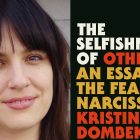Imprint(ing)s: An Interview With William Kemp of words(on)pages

There seems to have been an explosion of chapbook presses in Canada over the past decade, with mounds of small publishers emerging in multiple centers across the country, from Apt 9 Press, Desert Pets Press, and AngelHousePress to Baseline Press, Anstruther Press, The Blasted Tree, and Rahila’s Ghost Press. Another relatively new press to emerge is Toronto’s words(on)pages, an organization that self-describes as one “that supports, promotes, and engages emerging writers in Canada through workshops, publications, a prize, and a reading series.” They recently published three spring chapbooks and the final two issues of their literary magazine, (parenthetical), with three more chapbooks scheduled to appear this fall. They recently announced the winner of their second annual Blodwyn Memorial Prize for emerging writers this past June.
William Kemp is a founding editor at words(on)pages and co-edits/publishes alongside writer Nicole Brewer. In addition to his work with words(on)pages, William’s own writing has appeared in The Puritan, untethered magazine, in/words, First Person Scholar, and The Hart House Review.
rob mclennan: How did words(on)pages first begin? You seem to run a chapbook series, a reading series, and a poetry journal. Which came first, and how?
William Kemp: Officially, words(on)pages was started in March 2014, when we launched our “first” three chapbooks—they were by us and a friend, and we were essentially self-publishing under the name “words(on)pages.” Shortly after that, we started taking it seriously as a micropress, and figuring out what we wanted to produce, and how to produce it. The first step was our bimonthly literary magazine, (parenthetical), which launched its first issue in May 2014 at the first installation of the reading series, words(on)stages. As we produced more issues and booked more readers at our reading series, we were overwhelmed by the amount of talented writers who still hadn’t had the opportunity to be published in a collection of any length, so we decided to open ourselves up to chapbook submissions. In April 2015, we launched our first official words(on)pages chapbooks, by Domenica Martinello, Daniel Scott Tysdal, Simina Banu, and philip gordon. We have since launched four more seasons of chapbooks and twenty issues of (parenthetical), with another season of chapbooks launching this fall.
RM: Given how everything seems to have emerged from the reading series, how has the series evolved? How has the emergence of a journal and subsequent chapbook series altered the way you approach the events?
WK: It’s not so much that everything emerged from the reading series, but that a reading series seemed like a natural way to bring our physical projects— the chapbooks, the journal—into the community. The series has certainly evolved though. It started as a way for us to showcase more performative poets who we felt weren’t necessarily getting the deserved attention in the mainstream readings series, whether because of their style or their experience. Our first season was monthly, and our main focus was to bring together one or two “page” readers with one or two “stage” readers, to give the audience a diversity of performance.
Our second season, we started receiving funding from the Toronto Arts Council, and we changed the series to bimonthly, to coincide with the journal launches, since we found the “off” months in our first year weren’t drawing the same kind of crowd—full, attentive. (parenthetical) and the chapbooks haven’t exactly altered the way we approach the events, but they have provided a unique opportunity to draw more people and to maintain a high-quality open mic: contributors from the launching issue are invited to read their piece in an “open mic” spot at the beginning of the night, alongside other open mic-ers who can sign up the night of. In this way, the contributors often bring a few supporters each, in addition to anyone who would be coming to see the featured readers. It’s proved to be a really lovely way to get new faces every event, and to have a nice rounded audience every event as well.
In our latest season, we were still concerned with having a variety of styles and readers, but we wanted to try bringing in fiction writers alongside poets. It’s been exciting to see how those readings engage with each other, how sometimes a poet’s reading may feel like a story, how some of the fiction readers are incomparably poetic. Who’s to say what changes the future seasons may bring!
RM: Who were your publishing models, if any, when you were first starting out? And how have your publications evolved since you began?
WK: When we first started out, we had kind of three big influencers: Ferno House, BookThug, and The Puritan. On an aesthetic level, Ferno House produced the kind of chapbooks we aspired towards: beautiful, crafted, artisanal pieces of little literature. Spencer Gordon’s Feel Good! Look Great! Have a Blast! and Mat Laporte’s DEMONS were among the first chapbooks we saw in person at a small press fair, and we were in love with the aesthetic—with how much they valued not just the work inside, but their chapbooks as product; their chapbooks as art. And we’d like to think that we tried to model everything we’ve done after that approach, in a way.
The Puritan and BookThug inspired us as these established pillars of CanLit that were still so welcoming, so involved, and so ready to take chances. These were places that, despite having their own agenda—their own products—to promote, were always ready to share news that was great for CanLit in general, regardless of whether it benefitted them directly or not. We wanted words(on)pages to be about more than just us, more than our writers even, and The Puritan and BookThug gave us something to look up to, as these were places with so much more at stake, but who were ready to both stick to their guns editorially, as well as to put community first.
Our first words(on)pages chapbooks, and the first issue of (parenthetical), were some of the first handmade books we ever produced—ever, in our lives. So the quality had nowhere to go but up. From our paper to our stitching to our design, the publications have evolved physically into tighter, better crafted, more “professional” chapbooks that are still true to our origins—a team of two running all of this out of our too-small apartment, learning as we went along. As the basics became more like second nature, we’ve also become more willing to experiment—with design, with the physicality of the books—and not worry so much about the “return” on a chapbook. As our confidence has grown, it’s been liberating to kind of just say, fuck it, we really like this and we’re going to do what we can to present it in the best way possible so you can like it too.
RM: How did those first publications evolve? Were you soliciting work from those doing work you found exciting? Were there unsolicited submissions that came through that astounded? How did you manage to find work you were interested in producing?
WK: With both (parenthetical) and our chapbooks, we started off with 100 percent open submissions and continued/continue to run things this way. And really, all of the unsolicited work we publish is astounding, if we say so ourselves, because that is 100 percent of the work we published when we started publishing, and that is 100 percent of the work we publish now.
We felt pretty strongly—and still do feel this way—that soliciting work is in direct opposition to our mandate to focus on publishing emerging writers. We curated much of our first issue of (parenthetical), admittedly, through Tumblr, and luckily enough for us, it just kind of took off from there through word of mouth, through having a handful of really supportive peers and friends who believed in what we were doing and told people, who, maybe, didn’t know of us, or people who would be solicited on a more regular basis by other magazines and chapbook publishers to keep us on their radar.
We solicited work, one time, from Jacob Wren for issue thirteen of (parenthetical) as an experiment—a sort of “we think this writer is awesome, regardless of the label of ‘emerging’ or ‘established,’ here’s some great stuff by them” solicitation that would be ongoing and may be when our hiatus is up. And it was different for us because we only publish one piece per writer in our issues to have as much work from as many different voices as possible. In this instance, and in planned future installations, we’d feature multiple pieces from this solicited writer. Whether we’ll return to the idea is up to debate.
For our chapbooks, unless something drastically changes, we don’t particularly feel the need to solicit work. We’ve received incredible work from our open submissions, so we don’t feel the need to go out seeking it directly. We absolutely have many writers we’d love to work with, but we’ve been blessed with such exciting, innovative work through our open submissions for chapbooks, and honestly, for (parenthetical) as well, that the motivation to solicit work isn’t really that strong for us.
We do, admittedly, solicit for our reading series, but that’s kind of a different beast. It is one part needing to solicit to meet the requirements of Toronto Arts Council funding, and one part a very different mindset—readings are performance, after all. The good ones, are, at least, and we need to have an idea of what to expect going into a show. That said, a great number of our features at our reading series have been people we’ve met through the open mic to begin our shows, publishing their chapbooks, or publishing them in (parenthetical).
RM: How do you see your activity fitting into, or even interacting with, the larger landscape of literary publishers and publications in Toronto? How do you see yourself fitting into the larger scheme of Canadian literature?
WK: We’ve found that we seem to publish familiar names from quite a few lit mags in the Toronto scene—either we end up publishing work from someone whose name we saw pop up in a handful of places, or vice-versa: the writers are exposed to like-minded publications and editors through us. It’s not a conscious way of networking, but it is in the spirit of building community—we have similar sensibilities in our tastes, and we all want to make space for emerging writers. So we interact with other publishers who are working on a similar level as us, but because we’re not really tied up into the politics of name recognition, it means we don’t often connect with more “prestigious” literary magazines that solicit work for recognition as much as quality. Which is not to say we don’t keep tabs on what they’re up to—more that they’re probably not keeping tabs on us. In our own small way, we somewhat reject the idea of fitting into the larger landscape of literary publications in Toronto, in Canada, because we want to publish work by people nobody has ever seen before. It’s nice to “fit in,” of course, to be recognized, but we don’t let that guide us editorially; again, we don’t solicit work for our chapbooks or literary journal, and we try not to adhere to bandwagoning onto a group of “it” writers.
Still, we don’t live in a bubble, or try not to. We actively go out to readings, try to read as much new stuff as possible—not as a means to “network,” or to solicit work, but because we love literature. It just so happens that, hey, we also run a lit mag and a micropress so people talk to us and we talk to them, and, hey, surprise, we read a poem they wrote in such-and-such a lit mag, and, surprise, they read the latest issue of (parenthetical), and isn’t that neat.
Our engagement with the larger literary communities really comes back to us being Nicole and Will, lovers of literature. We try to be aware of our power, however minuscule it may feel at times, and read, share, and publish in ways that will benefit CanLit—in ways however minuscule. We started doing this because it felt like the community at large could only focus so much of their attention on a handful of writers, and we wanted to make space for more. And we didn’t want to make a space for more of the same. As people, we try to read critically and diversely, and as publishers we try to showcase stories and poems and writers that don’t or haven’t traditionally had much space to be themselves. CanLit kind of provides a very rigid definition of its canon for us to work against, not in an antagonistic way, but in a way that shows we understand there’s a long way to go before CanLit is actually representative of Canada’s literary writers.



